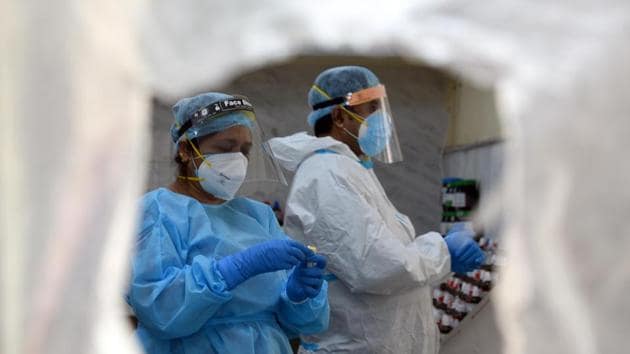Need to relook Covid-19 testing strategy, experts advise Centre
In a third joint statement on the Covid-19 pandemic in India, a task force of eminent public health experts has advised the government that the experience from other countries indicates that increased testing does not prevent the deaths from Covid-19.
Experts from Indian Public Health Association (IPHA) have recommended the Central government relook the Covid-19 testing strategy in such a way that it results in guiding the public health response and effectively limiting the spread of the disease.

In a third joint statement on the Covid-19 pandemic in India, a task force of eminent public health experts has advised the government that the experience from other countries indicates that increased testing does not prevent the deaths from Covid-19.
“A few countries like Japan, Sri Lanka with the lowest testing rates have the lowest fatality due to Covid-19. There is evidence from other countries too that the present testing strategies are unable to contain deaths and transmission of SARS-CoV-2,” it said.
Dr Sanjay Rai, President of IPHA said: “The current benchmark for the adequacy of testing is 140 tests per million population per day, and sample positivity rate of less than five percent. In order to reach this target indiscriminate testing is being resorted to. Testing by itself is not a control strategy. Moreover, daily testing of more than one million, mostly ill-defined population, is imposing heavy economic cost without commensurate benefit for control effort.”
“There is a need to relook at the testing strategy in a way that it results in guiding the public health response and effectively limiting the spread of the disease,” he said.
So far, India has reported about 36 lakh Covid-19 cases with 64,469 deaths. Till date, India has conducted 4,23,07,914 tests for Covid-19, and at least 8,46,278 of those were conducted in the last 24 hours.
“The testing strategies in densely populated urban areas, and the limited disease spread in rural areas must be different. In most cases, by the time the testing is done and the results are made available, the infection has already spread to close contacts. This is more pronounced in rural areas,” Dr Rai said in the report.
The presence of a large number of asymptomatic cases in all states/UTs further compounds the problem of early detection as the current testing strategy does not allow for testing of asymptomatic persons unless they are close contacts of a diagnosed case, the report mentioned.
A large number of tests e.g. RT-PCR, CBNAAT, TRUNAT, RAT, etc have been employed for the Covid-19 test. In order to achieve the pre-defined target, peripheral health functionaries are using whichever test is available, flouting the guidelines. For example, use of RAT in areas that are neither a containment zone nor a health facility.
The strategy of “Test, Track, Treat, isolate” focusing on early identification of the cases to limit their transmission to others and also for effective clinical management is helpful when the epidemic is at its very early stage to avoid its foothold in the community.
“Since the virus has already widely spread in the community in many geographical areas, the current strategy would not serve the intended objectives. Moreover, confirmed cases represent only a fraction of the total estimated cases as is indicated by sero-surveillance surveys. Hence, a greater number of tests being carried out will yield a greater number of detected cases without any benefit in reducing the deaths which should be the primary goal,” experts noted.
“In areas with high incidence of laboratory-confirmed cases, all symptomatic cases should be treated on the lines of confirmed cases to isolate and treat to reduce the spread and mortality even without testing as the probability of being positive is quite high. This is the usual practice adopted during an outbreak situation. This brings efficiency in preventing the spread of infection and making it cost-effective,” it read.
There is a need to re-assess the thrust on testing strategy and shift to syndromic management, especially in the high sero-prevalence states and districts for efficient management of resources.
A pragmatic and differential testing strategy needs to address issues of testing high-risk populations, testing only in the early stages of the outbreak, and testing as part of monitoring. Universalization of testing may be an extremely expensive proposition and unlikely to yield any public health benefits for control strategy, the report said.
A joint task force of eminent public health experts of India was constituted by IPHA, and the Indian Association of Preventive and Social Medicine (IAPSM) in April 2020 to advise the Union government for containment of the Covid-19 pandemic in the country.
Get Current Updates on India News, Lok Sabha election 2024 live, Election 2024 along with Latest News and Top Headlines from India and around the world.



